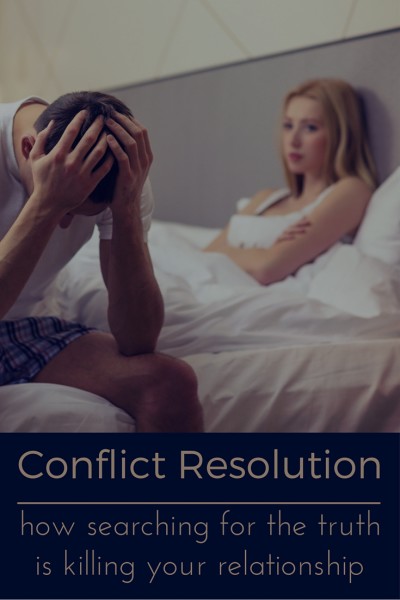
A new way to resolve conflict
We like to think the typical marriage arguments have a beginning, middle, and end. The reality is, we are most likely fighting the same fight, in different forms, over and over and over again without successful conflict resolution. At least I know this was the case for Henry and me.
The more we talked about certain issues, the more upset we became, the more we pointed fingers and tried to convince the other why it wasn’t our fault. We were bent on casting blame and finding the truth – – who had done what, who had said what, and who better get their act together.
We’re competitive and even if we were nice enough to not bring up old hurts, the new ones simply piled on top of issues we had no idea how to solve. We usually ended up in a big disagreement about every six months that ending with me crying, Henry retreating, and then one or both of us apologizing and making up. It was a vicious cycle that enabled us to vent our feelings without ever really solving anything.
Realizing the truth about truth
We fought like this until we learned the truth isn’t really what matters in a relationship. I know it sounds weird, but looking for the truth was literally killing our marriage. We had bought into the idea that two emotional people, with completely different perspectives, could convince each other of a truth that happened during a split-second of time – and hash and rehash it until we could make the other feel okay and perhaps agree. Bwahahahahaha! It makes me laugh to read it. Why?
Because the truth may matter in math, science, and the court of law, but it doesn’t matter in relationships, at least not when it comes to solving conflict. When we start off with the wrong focus, we lose sight of the big picture.
Getting to the heart of the matter.
The thing that matters more than the truth in the midst of a conflict is feelings. It’s been said that “the heart of the matter is sometimes a matter of the heart.” The real thing to focus on is “how did the situation make my partner or me feel?”
Great, you’re thinking. Back to the old advice of, “When you do ______, it makes feel _______. And then it sits there, that feeling. And I’m supposed to say “sorry” and you’re supposed to say “I forgive you” and then somehow, that’s supposed to make us feel more connected and all lovey-dovey and {poof!} everything’s solved.
I don’t know about you, but that rarely worked in my marriage. The issue was always there. Wanna know why?
Instead of exploring the feeling, Henry or I would take the brunt of the blame (still looking for the truth) and try to “fix” our behavior going forward. Somehow we thought it was our job to never hurt the other person or disappoint them.
We became focused on our behavior affecting the other person’s feelings. That’s not intimacy. It’s performance. And performance will not sustain a marriage. {Tweet that}
Cue the active listening!
Here’s what we learned to do… we learned to lean into the other person’s feelings…. to get curious and remove ourselves completely from the equation. I may have hurt the other person’s feelings, but why? What did my actions trigger deep inside that caused the anger, hurt, or fear? To find this out, we must take a personal step back, fight the urge to become defensive or prove our point and become a conduit through which the other person can explore their reaction.
This is hard because it’s a new way of communication. It’s not natural to our built-in human response of flight or flight. Most of us when presented with words hurled at us in hurt, want to respond in kind and defend ourselves to the bitter end or walk out when things get too heated.
This new form of communication means putting aside our own feelings for a few minutes. Taking a deep breath, warding off the fight or flight, and getting to a place where we can calmly draw out the other person – – into a safe arena where they can let their guard down and do the gut-wrenching work of unpacking things they’ve probably never thought about… unraveling why visceral reactions occur, what they might mean, and most importantly, how to move forward.
Honestly, when we first started this style of communication, I wasn’t very good at unpacking my feelings. I had repressed and hidden them for so long I had no idea how to explore what I was feeling, let alone what Henry was feeling. It took practice and work.
Active listening is a learned skill, but once you get the knack for it, you’ll never want to go back. It’s in these moments where the real work of emotional intimacy starts. Here’s an example of how to take the first step…
Our Story
One Sunday morning I sat in church with tears streaming down my cheeks. It was during the praise and worship portion of the service so I was able to wipe my tears in the dim lighting without bringing too much attention to myself. After the service, as people filed out around us, Henry turned to me and said, “Are you okay?”
“Yeah. I’m fine,” I said, like a typical woman.
“Fine? You were bawling your eyes out. What’s wrong?” he asked.
“I’m just pregnant,” I said. “Sometimes the worship overwhelms me.”
He pushed further. “No, really. I don’t think that was a pregnant cry. What’s going on?”
I could tell him why I was bawling my eyes out or I could push it under the rug. You see, the night before he’d gone out to play cards and I felt alone and abandoned at home. I didn’t want him to go, but I couldn’t really offer a good reason for him to stay. I was pregnant and tired and really just wanted to curl up and snuggle. I could’ve answered several “acceptable” ways. One popular thing I could’ve said was, “When you go play cards, I feel lonely.” It would be true. That’s how I felt. But it also has several flaws to solving conflict.
- It makes an assumption that every time Henry leaves to play cards I feel lonely, which isn’t true. It was more a function of how I felt on that particular evening.
- It makes the assumption that Henry’s job is to make me feel not lonely all of the time, which is equally not true. My spouse isn’t meant to fulfill all of my emotional and social needs. In fact, it’s impossible for him to do so.
- It places the blame of how I felt on him. We are each responsible for our own feelings. We must own them to heal from them.
Here’s what I said instead… “I feel so disconnected and lonely. I want to feel connected to you and it made me sad. It all just kind of hit me in the quietness of worship.”
I could’ve brought up the cards, but really it’s not pertinent information at this point, because as I mentioned, there are others times I could care less about him playing cards. It becomes a red herring to fight over. So eliminating it can be helpful in situations like this.
Henry’s response was probably what any husband would have done in that situation…. he leaned over and hugged me to him. Wrapped his arms around his pregnant wife and murmured that he wanted to feel connected too. That he wanted her to feel like she was important and the best thing that ever happened to him. He spoke words of life into my soul.
This is a lovey-feel-goody story. And my explanation was great and his response was stellar. But we could have actually gone further. Want to know why? Because the core issue was never addressed… just the visceral reaction. Henry did the right thing of pouring into me and working on being connected, but we could’ve explored my feelings a tad bit more. Here’s how….
Me: I feel so disconnected and lonely…
Henry: Oh honey, I hate that you feel disconnected. That’s such an awful feeling. I wonder why you’re feeling disconnected… (acknowledgment, empathy, curiosity)
Me: Well, it didn’t help that you went out last night. (a little blame, but exploring the action)
Henry: Hmmmm… I wonder what was so different about last night. Many times you don’t care when I go out, but you did last night. What do you think was different? How were you feeling last night? (completely removed, not defensive, exploring feelings)
Me: I was so tired but I wanted to be with you. Maybe I wanted to be taken care of…. (trying to figure my hormonal emotions out!)
Henry: And I left instead of taking care of you… (finding the core issue)
Me: Yeah. I guess so.
Henry: I love you, baby. And want to take care of you. I’m sorry you ended up feeling abandoned. Let’s go home and spend some time connecting this afternoon.
This is just the short version of how active listening can deepen emotional intimacy. A great follow up conversation could be Henry saying, “You know the other day when you were feeling abandoned? Do you think there’s something bigger, something more ingrained, that caused you to feel that way when I went out?”
We might find that I have underlying feelings of abandonment, feeling like I’m not a priority, feeling neglected…. things that may have developed in our relationship or even as early as childhood. This could lead to a conversation about memories of growing up, how I felt in my family of origin, how he felt in his family of origin. What “taken care of” or “made a priority” looks like to each of us.
The important thing is to talk…like really talk…. about things that are buried so deep we don’t even know they’re there.
Leaving behind the “truth” of if Henry should have played cards or if I should “let” him go out, or if I should feel “abandoned” or any of that would completely destroy what we are trying to achieve.
We get so busy trying to convince the other of how to “fix” the situation that we never get to the work of melding our hearts and spirits with emotions and intimacy. We don’t become safe harbors from the storm – – we are the storm! We become the person to run from, to hide from, and to escape from. That is the opposite of intimacy!
Bringing it in for closure
Sometimes the conversations aren’t so neat and tidy like the one above. One or both of us still feel some angst or still feels unsettled. I’ve found it best to just let the feelings hang out there… not try to fix them with more talking. Once we’ve hit the core issue, explored it, and gotten it into the fresh air, sometimes the best thing is just to close it all out with a hug. Whisper how much you love the other person and are lucky to have someone in life who can let you feel and speak your mind without criticism. Funny thing is, doing that usually “fixes” it. You replace the tension in the air with acceptance and intimacy.
This approach has not only changed my marriage but also changed the way I approach conflict with anyone, even outside of my family. I listen for the core emotional issue and ask questions around it. It’s amazing how people’s defenses come down and conflict is resolved instead of fueled.
To repeat, this approach isn’t natural and doesn’t come easily. It’s something that takes practice, hard work, and dedication. We learned with the help of a third party, and I think that’s a good idea when you’re starting out. {shameless plug for couples coaching!}
Do you find yourself having the same argument in different forms repeatedly in your relationship? Give this approach a try.
Did you find this article helpful? If so, share it via the social media buttons below and subscribe in the box to the right to receive post alerts straight to your box.
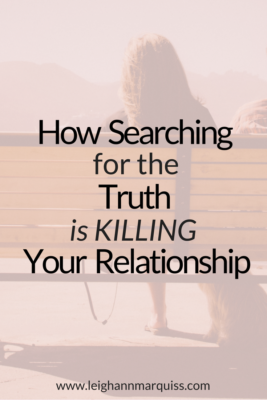
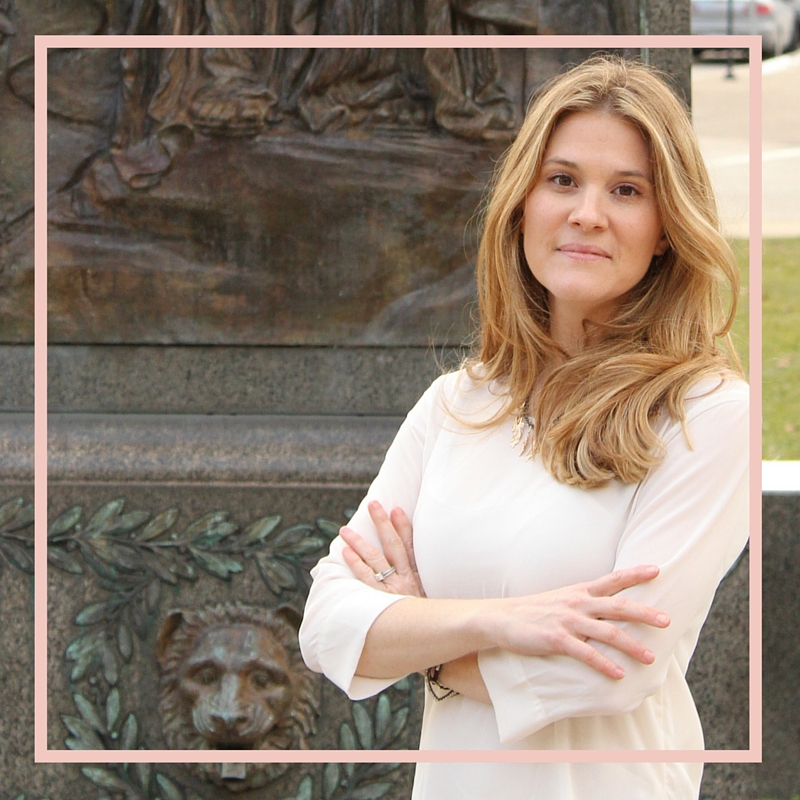
Hi! I’m Leighann. I help busy women go from frazzled to fabulous. I talk about winning imperfectly at life, finding hope in every season, and learning to manage stress while accomplishing your goals. But wait! I have two freebies below – don’t miss out on them – one to cultivate more calm in your life and the other to increase your productivity. Download them now!
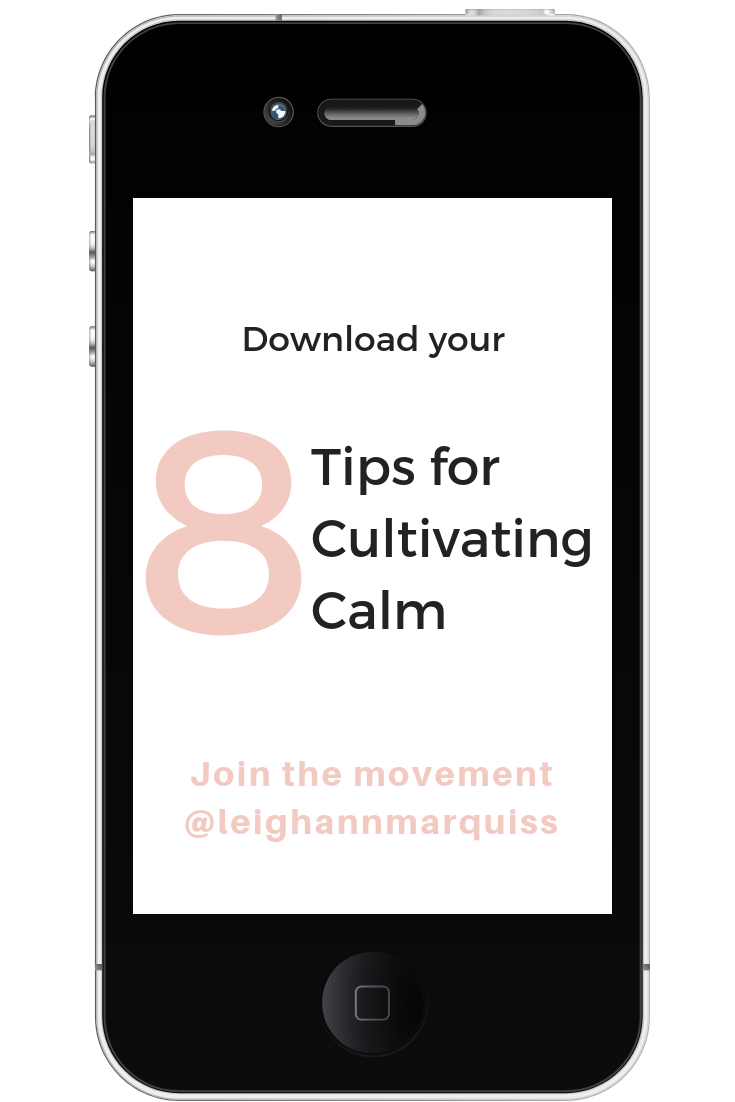
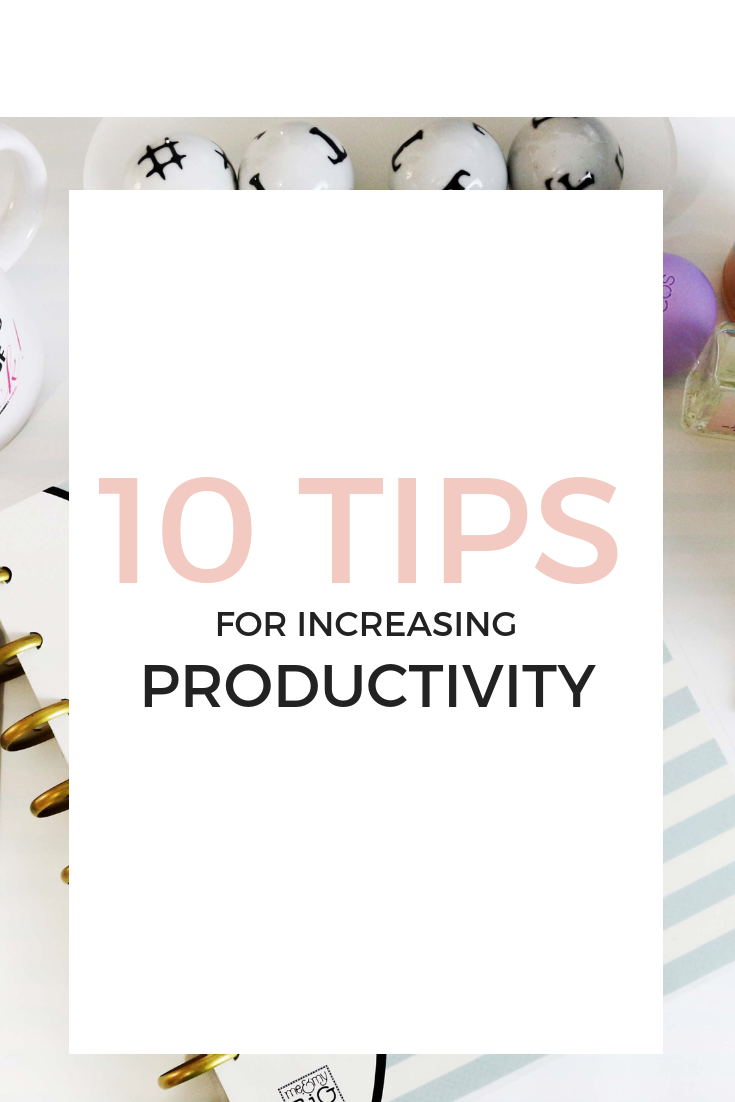




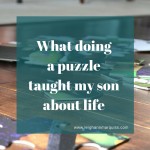
Comments (2)
This is great. We used to argue in circles and circles until we figured this out through trial and error and advice from wise people.
So true, Becky. I’m not sure how we got so far without this method.